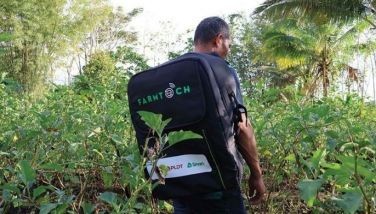Philippines needs to discover new gas field – experts
Malampaya reserves expected to be depleted by 2024
MANILA, Philippines - The Philippines needs to discover another Malampaya gas field with the depletion of natural gas from the deep water gas-to-power project looming in 2024, experts said during a natural gas summit held last week.
The search for another Malampaya must be a national priority, they said.
“What is next after Malampaya? The reservoir will be depleted. It takes a decade to get those things to happen? Shouldn’t we start exploring now? Shouldn’t we start to have appraisal (of areas) now? Unfortunately, that is not yet going to happen. There is difficulty in getting exploration blocks,” said Shell Philippines B.V. Managing Director Sebastian Quinones, who is also president of the Petroleum Association of the Philippines (PAP).
The PAP, which counts 30 members, urged the government to streamline the procedures. The drag turns off exploration companies and discourages them from pouring in billions in investments for exploration, Quinones said.
“We need to talk to a lot of government agencies. For example, we need to bring in expensive equipment. We need fiscal incentives so we really hope the government can streamline procedures,” he said in a separate interview with The STAR.
Malampaya, which began operating in 2001, is a joint undertaking of the government and the private sector. The project is spearheaded by the Department of Energy and developed and operated by Shell Philippines Exploration B.V. (Spex), with a 45 percent stake on behalf of joint venture partners Chevron Malampaya LLC, also with a 45 percent stake and the PNOC Exploration Corp. which holds the remaining 10 percent.
Under the service contract agreement, 70 percent of the gross proceeds from the sale of natural gas would go to the contractor to recover the investment cost. The remaining 30 percent is shared by the government and the consortium on a 60-40 basis, respectively.
Upon its discovery, it had about 2.7 trillion cubic feet of natural gas reserves and 85 million barrels of condensate, located some 3,000 meters below sea level.
The indigenous gas from the field fuels three natural gas-fired power stations with a total generating capacity of 2,700 megawatts, accounting for roughly 45 percent of Luzon’s power generation requirements. These power plants are the 1,000 MW Sta. Rita and 500-MW San Lorenzo plants owned by the Lopez Group and the 1,200 MW Ilijan plant owned by Kepco Philippines.
“We are really appealing to the government to put in mechanisms to be able to drill. For those who don’t know, in other countries, they drill 60 to 100 wells a year. The Philippines, last year, drilled only two wells. We need the government to be able to work out a way for that to happen,” Quinones said.
Otto Energy, an Australia listed exploration company, shared the same view.
“Given that Malampaya is projected to be depleted in the next decade, looking for the next Malampaya should be a national priority. I’ve always believed that there must be another Malampaya somewhere out there in offshore Palawan. Is there another one? Only exploration can tell us,” said Rufino Bomasang, director of Otto Energy.
- Latest
- Trending



























